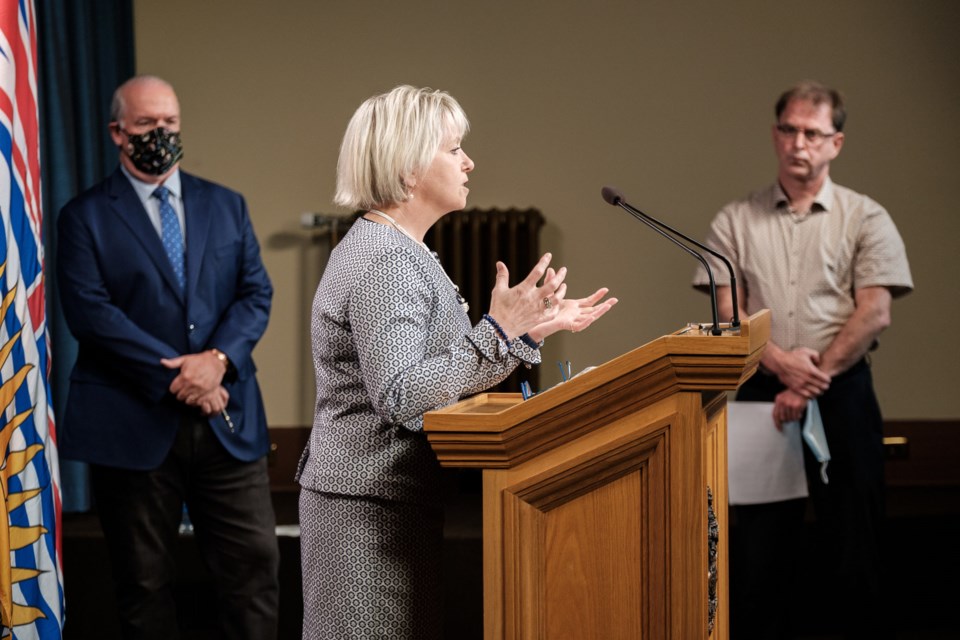BC’s vaccine card seems like the right policy at the right time, as the province struggles with concerning pressure on its hospital system during this fourth wave of the pandemic.
Health Minister Adrian Dix gave an unusually impassioned appeal to British Columbians on Thursday, as he revealed intensive care units are struggling with rising numbers of COVID-19 patients - 87 per cent of whom are unvaccinated - and hospitals are having to reschedule non-urgent surgeries.
“Choosing to stay unvaccinated when we are able to be vaccinated is simply holding a red flag to a virus that spreads to live - you can see it in those critical care numbers,” said Dix.
“We need to know that after all we have been through, the data is clear, the evidence conclusive, the science definite. And just to say that there is absolutely, with that in mind, nothing heroic in presenting a target for COVID-19. There is nothing altruistic in attracting its infectious aim. There is nothing gained by anyone when someone falls victim to its vicious hold.”
The number of people in ICU in B.C. has increased 550 per cent in the last month, to 130 patients as of Thursday.
That, and high case counts, prompted Dr. Bonnie Henry to declare this week she would have to bring back more restrictions on businesses and social activity this fall if the government did not try to implement the vaccine card system first.
That alone makes it the right move.
In essence, the new system bans unvaccinated people from being able to visit movie theatres, restaurants, indoor sports games, and other “non-essential” social activities as an incentive to get vaccinated.
It does this by requiring those of us who are vaccinated to use a relatively simple system of QR codes or paper vaccine records to gain entry into those same establishments.
That’s prompted some in the anti-vax and anti-authority crowd to complain their freedoms are being unfairly restricted.
Henry has been clear that essential services like health care, schools, and grocery stores remain open regardless of vaccination status, but privileges like dining out or attending a concert are off-limits to those who refuse to take simple steps to protect the community from the spread of the virus.
“Going up against this virus by going on with our daily lives unvaccinated and unprotected helps only the virus,” said Dix. “Going up against the virus by rejecting the facts, the data, the evidence and the science of its destructive purpose hurts only us all.
“British Columbia is a more thoughtful place and will be a better place because of those who see things differently, have an alternate perspective, a contrasting viewpoint. But COVID-19, while it is many things, is not debating us on these questions. The virus doesn't debate us. The only way past COVID-19 is to take the one safer road through it, and for all those eligible that is the road of vaccination.”
So far, the vaccine passport system has been mostly free of the technical snafus that have plagued previous government IT projects like the online vaccine appointment system earlier this year, which completely crashed.
Wait times, while as high as an hour on the first day, were non-existent by day three. Most people seemed to be able to figure out how to generate a passport and either save it to their phone or print it off. More than 1.1 million people out of almost four million who received a first shot had accessed their passport within the first three days.
That’s not to say there aren’t major bumps ahead.
In some parts of the province, with low vaccination rates, business owners will be faced with having to turn away thousands of people in their communities, without any enforcement help from the government.
The province could have done more to assist them by deputizing some sort of enforcement squad to hand out tickets and rapidly respond to businesses faced with anti-vax protesters and angry customers.
The government also hasn’t laid out a clear path to shut down business owners who plan to defy the vaccine card. We know that’s coming, because a Facebook group of businesses refusing to follow the rules has more than 100,000 members, and several owners have already spoken publicly about their intentions.
How much leeway will the province give those businesses? How long will it take to bring in serious enforcement and closures? Is BC prepared to handle the civil disobedience and protests that will likely follow by the small but vocal group of those against the vaccine passport system?
That’s all unclear.
But bringing in a system that incentivizes vaccination, while allowing freedoms for those who’ve already got the jab, remains the right move, right now.
Let's hope it works.
Rob Shaw has spent more than 13 years covering BC politics, now reporting for CHEK News and writing for The Orca. He is the co-author of the national best-selling book A Matter of Confidence, and a regular guest on CBC Radio.
SWIM ON:
- Rob Shaw: Schools will no longer send email notifications when someone tests positive for COVID-19, which parents and BC's teachers' union view as a step much too soon.
- Back in February, Jody Vance foresaw all this: the next big divisive pandemic debate would be vaccine passports. They’re either a no-way or no-brainer.
- Political strategist Katy Merrifield on shots promised, shots that couldn’t be scheduled, and shots fired in media and the legislature.



